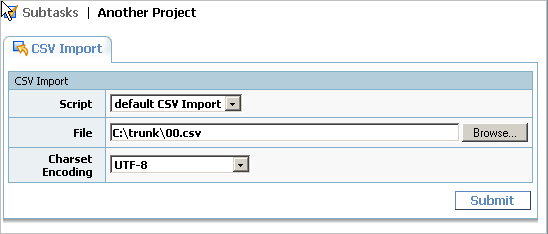The following topic describes how to import data from a CSV file.

CSV file example:
Category,Name,Status,Handler,Submit Date Folder,“Sample, Inc”,active,Mike Clinton,10/19/04 2:35 PM Software Bug,Can’t login,003 Closed,,10/19/04 2:50 PM
Use the following script to get the values of the attributes:
String categoryName = (String) inputMap.get("Category");
String taskName = (String) inputMap.get("Name");
String statusName = (String) inputMap.get("Status");
String handlerName = (String) inputMap.get("Handler");
String submitDateStr = (String) inputMap.get("Submit Date");Use the following script to import a task from the specified file:
Map taskMap = new HashMap(); String locale = sc.getUser().getLocale(); DateFormatter df = new DateFormatter(sc.getUser().getTimezone(), locale); taskMap.put(CSVImport.TASK_NAME, inputMap.get("Name")); taskMap.put(CSVImport.TASK_CATEGORY_ID, CSVImport.findCategoryIdByName((String) inputMap.get("Category"))); taskMap.put(CSVImport.TASK_STATUS_ID, CSVImport.findStateIdByName((String) inputMap.get("Status"), (String) inputMap.get("Category"))); taskMap.put(CSVImport.TASK_HANDLER_USER_ID, CSVImport.findUserIdByName((String) inputMap.get("Handler"))); taskMap.put(CSVImport.TASK_SUBMIT_DATE, inputMap.get("Submit Date") != null ? df.parseToCalendar((String) inputMap.get("Submit Date")) : null); return taskMap;
The CSV file and the CSV Import script shown below demonstrate how to import custom fields of various types.
CSV file:
Name,Category,UserUDF,URLUDF,MultiListUDF,TaskUDF,IntegerUDF,ListUDF,DateUDF,FloadUDF,StringUDF,MemoUDF
"Products","Folder","jsmith;pdagley;slaw","http://www.trackstudio.com - TrackStudio",
"multiListValue3;multiListValue4","#2;#4;#5","54","listValue2","12/16/05 3:38 PM",
"5.6","stringUdf value","memo UDF value"
"Customer Support","Folder","cparmenter;smanske","http://localhost:8888/TrackStudio - local TrackStudio instance",
"multiListValue1;multiListValue2;multiListValue4","#15;#16;#18;#22;#23","33","listValue2","12/30/05 3:40 PM",
"43.6","str val2","memval2"CSV Import script:
Map taskMap = new HashMap(); String locale = sc.getUser().getLocale(); DateFormatter df = new DateFormatter(sc.getUser().getTimezone(), locale); taskMap.put(CSVImport.TASK_NAME, inputMap.get("Name")); taskMap.put(CSVImport.TASK_CATEGORY_ID, CSVImport.findCategoryIdByName((String) inputMap.get("Category"))); Map udfMap = new HashMap(); if (inputMap.get("MemoUDF") != null) udfMap.put("MemoUDF", inputMap.get("MemoUDF")); if (inputMap.get("DateUDF") != null && !inputMap.get("DateUDF").equals("")) udfMap.put("DateUDF", sc.getUser().getDateFormatter().parse( df.parseToCalendar((String)inputMap.get("DateUDF")))); if (inputMap.get("FloadUDF") != null) udfMap.put("FloadUDF", inputMap.get("FloadUDF")); if (inputMap.get("IntegerUDF") != null) udfMap.put("IntegerUDF", inputMap.get("IntegerUDF")); if (inputMap.get("StringUDF") != null) udfMap.put("StringUDF", inputMap.get("StringUDF")); if (inputMap.get("ListUDF") != null) udfMap.put("ListUDF", inputMap.get("ListUDF")); if (inputMap.get("MultiListUDF") != null) udfMap.put("MultiListUDF", inputMap.get("MultiListUDF")); if (inputMap.get("TaskUDF") != null) udfMap.put("TaskUDF", inputMap.get("TaskUDF")); if (inputMap.get("UserUDF") != null) udfMap.put("UserUDF", inputMap.get("UserUDF")); if (inputMap.get("URLUDF") != null) udfMap.put("URLUDF",inputMap.get("URLUDF")); taskMap.put(CSVImport.TASK_UDF_MAP, udfMap); return taskMap;
The following script shows how several linked objects are imported. This script imports tasks and if there is no user with the task handler's name in the system, the script creates a user with the specified name:
Collection list = new ArrayList(); Map taskMap = new HashMap(); taskMap.put(CSVImport.TASK_NAME, inputMap.get("Name")); taskMap.put(CSVImport.TASK_CATEGORY_ID, CSVImport.findCategoryIdByName((String) inputMap.get("Category"))); list.add(taskMap); String msgHandlerName = (String) inputMap.get("Message Handler"); String msgHandlerId = null; Map userMap = new HashMap(); if (msgHandlerName != null && msgHandlerName.length() != 0) { msgHandlerId = CSVImport.findUserIdByName(msgHandlerName); if (msgHandlerId == null) { userMap.put(CSVImport.OBJECT_TYPE, CSVImport.USER_TYPE); userMap.put(CSVImport.USER_NAME, msgHandlerName); userMap.put(CSVImport.USER_LOGIN, msgHandlerName); userMap.put(CSVImport.USER_PRSTATUS_ID, CSVImport.findUserStatusIdByName("administrator")); userMap.put(CSVImport.USER_COMPANY, "Co."); list.add(userMap); } } Map messageMap = new HashMap(); messageMap.put(CSVImport.OBJECT_TYPE, CSVImport.MESSAGE_TYPE); messageMap.put(CSVImport.MESSAGE_TASK_ID, taskMap); if(msgHandlerId != null ) messageMap.put(CSVImport.MESSAGE_HANDLER_USER_ID, msgHandlerId); else messageMap.put(CSVImport.MESSAGE_HANDLER_USER_ID, userMap); messageMap.put(CSVImport.MESSAGE_MESSAGE_TYPE_ID, CSVImport.findMessageTypeIdByName( (String)inputMap.get("Message Type"), (String)inputMap.get("Category"))); list.add(messageMap); return list;